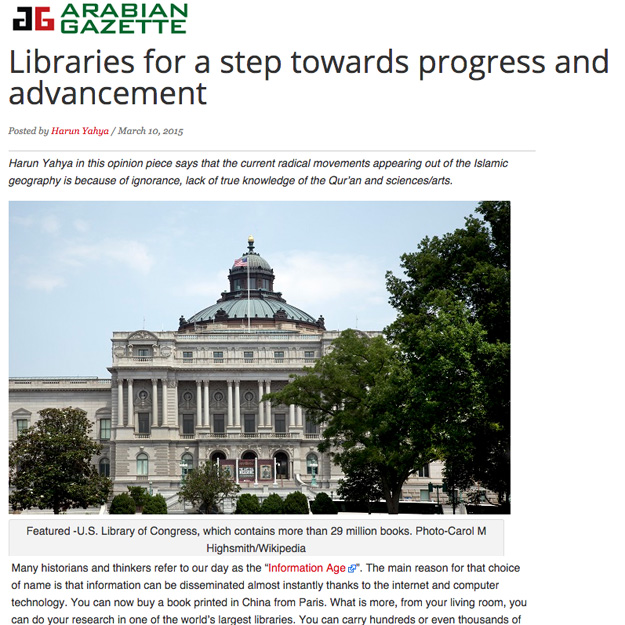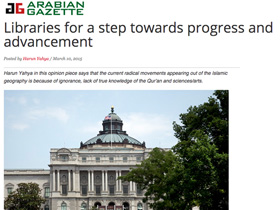
Many historians and thinkers refer to our day as the “Information Age”. The main reason for that choice of name is that information can be disseminated almost instantly thanks to the internet and computer technology. You can now buy a book printed in China from Paris. What is more, from your living room, you can do your research in one of the world’s largest libraries. You can carry hundreds or even thousands of books with you everywhere with a memory stick, smart phone or tablet.
There is no doubt that while developing technology has played a very great role in this dissemination, books have been the main component of information. It was the development of printing technology that allowed Europe to emerge from the Middle Ages. In 1450, Johannes Gutenberg and his partner Fust discovered a printing technic using metal letters and established the first printing press in Mainz, Germany. The number of books in circulation, which had previously resembled rare works of art and were painstakingly copied by hand, rose very rapidly by means of this. Books, which came to be a part of just about all homes, were then collected in places for people to read, making it possible for them to become acquainted with places and learn about things they had never seen.
Printing technology started to be used in the Ottoman Empire 277 years later than in Europe. The effect of that difference on the Empire revealed itself throughout the history. Developments of vital importance to a country, such as the modernization of the military, a science-based education system and improvements in bureaucracy, all occurred later in the Ottoman Empire than in Europe.
Modern Turkey is trying to avoid such errors and neglect. One sign of this is that a giant library is to be opened in the recently completed Presidential palace in Ankara. The aim is for this library to contain four million books. The fact that the number of printed books in the Turkish National Library is 1.3 million gives an idea of the scale of that target. While the number of books may be large for Turkey, it is really quite modest compared with libraries in the West. The total number of books in all the libraries in Turkey is 16 million, while the U.S. Library of Congress contains more than 29 million.
Visitors to the library in the Presidential Palace will be able to work and study there 24 hours a day. Such a library may be new for Turkey, but there are much larger libraries in Europe and America. The library will therefore be a first for Turkey in terms of technical means as well as number of books.
It is very important for the works in the library to be available in a digital format (electronic library) for visitors to be able to research in a computer environment. In the event that this opportunity is made available to everyone over the internet, then it would be possible for Turkey to close the 227-year difference between it and Europe, and even to pull ahead eventually. For a student in Erzurum to be able to log on to the library in Ankara and access a written work there will represent a revolution in education. In the event that this electronic library is linked to the Fatih Project, students from all over Turkey will be able to make use of the library.
These things are not of course sufficient by themselves. The library must enjoy adequate and sustainable financial support. Sufficient numbers of qualified personnel must be employed there. Not only books, but also manuscripts and pictures must be included. The library must be supported by an advanced automation system. It must collaborate and share resources with other libraries, and joint projects must be produced. As part of these projects, mobile libraries can also visit the more remote parts of Anatolia where access to the internet is still limited.
Such a project can change attitudes to science and education, not only inside the country but in all the Turkish and Islamic world. Because of the prevailing climate of conflict, the Islamic world is unable to maintain its present position, let alone make new scientific discoveries. Ignorance is at terrifying levels in some Islamic countries.
One common feature among countries where domestic strife is at a peak, such as Afghanistan, Yemen, Pakistan and Bangladesh, is that literacy levels are very low. Ninety-seven percent of women and 77% of men in Afghanistan and 91% of women and 57% of men in Yemen are illiterate. These figures are just one of the indicators of the backwardness in the economic, scientific and technological spheres in the Islamic world.
There are various reasons why ignorance has become a structural characteristic of the people in Islamic lands. First and foremost, external factors such as “distorted international power relations” and “colonialism” have had a major cumulative destructive impact on Islamic lands. There are almost no Muslims lands, with the exception of Turkey and Iran, that have not been colonized at one time or another. Exploited and colonized Muslims have grown increasingly poor, and poverty has worsened ignorance.
Radicalism has also grown with ignorance. A thousand years ago, a Muslim regarded studying astronomy as part of their faith: Today, however, radical minds regard scientific research as a waste of time. Yet science is encouraged in many verses of the Qur’an.
With ignorance, the elements between Muslims, which allowed them to coalesce around an ideal, have weakened, and they have now begun regarding one another, not as brothers, but as enemies. Domestic disputes and upheaval, and undemocratic political systems have spread like wildfire in Islamic countries. It has become impossible to engage in education and science in such a climate, let alone build libraries.
In order to break this climate of ignorance and radicalism, Muslims must again start to read and investigate everything happening in nature and the world. They must do that with a desire to know God and His creations.
Adnan Oktar's piece on Arabian Gazette:
http://www.arabiangazette.com/libraries-for-a-step-towards-progress-and-advancement/


